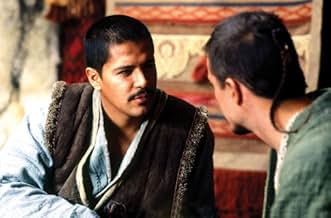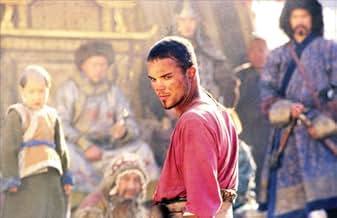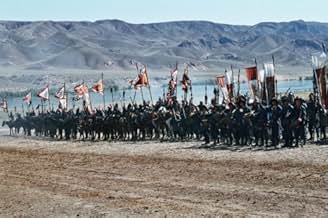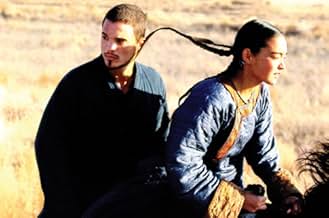IMDb RATING
5.8/10
4.1K
YOUR RATING
A historical epic set in 18th-century Kazakhstan, where a young man is destined to unite the country's three warring tribes.A historical epic set in 18th-century Kazakhstan, where a young man is destined to unite the country's three warring tribes.A historical epic set in 18th-century Kazakhstan, where a young man is destined to unite the country's three warring tribes.
- Directors
- Writer
- Stars
- Awards
- 2 nominations total
Ayanat Ksenbai
- Gaukhar
- (as Ayana Yesmagambetova)
Yerik Zholzhaksynov
- Barak
- (as Erik Zholzhaksynov)
- Directors
- Writer
- All cast & crew
- Production, box office & more at IMDbPro
Featured reviews
Nomad is no different from American epics. Had the spoken language been English instead of Kazakh, it would have been impossible to distinguish this film from movies like Gladiator, Braveheart or Troy. It's just the latest entry in an overused genre. Still, I enjoyed watching Nomad. It entertained me for two hours even if I knew where the story was headed to, and that's all I demanded from it.
Like so many other similar flicks, Nomad deals with a tyrant, the people he's been tormenting for years, and a "chosen one" who will eventually dethrone him. When he first hears of this, the cruel dictator orders that this child be found and immediately killed. Naturally, the attempt fails, and the boy is raised in a remote village by an old, wise father figure, a character clearly based on the Merlin/Gandalf/Obi-Wan Kenobi blueprint. As the years pass, our hero, named Mansur (Kuno Becker), becomes a skilled warrior, perfectly capable of leading his rebellious countrymen in battle against the evil monarch. While preparing for the conflict, Mansur also has to deal with his feelings for a girl and the effects said romance is having on his lifelong friendship with Erali (Jay Hernandez), a man willing to do anything for his country and, most importantly, his leader and best friend.
The themes explored in epics are generally love, loyalty and freedom, and Nomad covers all of them them in a competent but predictable way: anyone who's ever seen this kind of movie will have no trouble figuring out how the various subplots, not to mention the big picture in itself, are going to end. But while it isn't exactly fresh, Nomad is a respectable film, its main quality lying in the visuals: the battle scenes are as great and gorgeous as in a Ridley Scott film, and the same should be said of the numerous shots concerning the eye-popping landscapes. In fact, with so much beautiful imagery (although a bit more violent than the average Hollywood blockbuster), it's a bit weird not to find the Blade Runner director's name among the executive producers, which do however include Milos Forman (the man behind the fabulous Amadeus).
So, as usual, style prevails over content, but when it looks so good, why complain? Nomad is a piece of pure, simple, unadulterated fun; that's why I liked it, and the reason genre fans should embrace it as well.
7,5/10
Like so many other similar flicks, Nomad deals with a tyrant, the people he's been tormenting for years, and a "chosen one" who will eventually dethrone him. When he first hears of this, the cruel dictator orders that this child be found and immediately killed. Naturally, the attempt fails, and the boy is raised in a remote village by an old, wise father figure, a character clearly based on the Merlin/Gandalf/Obi-Wan Kenobi blueprint. As the years pass, our hero, named Mansur (Kuno Becker), becomes a skilled warrior, perfectly capable of leading his rebellious countrymen in battle against the evil monarch. While preparing for the conflict, Mansur also has to deal with his feelings for a girl and the effects said romance is having on his lifelong friendship with Erali (Jay Hernandez), a man willing to do anything for his country and, most importantly, his leader and best friend.
The themes explored in epics are generally love, loyalty and freedom, and Nomad covers all of them them in a competent but predictable way: anyone who's ever seen this kind of movie will have no trouble figuring out how the various subplots, not to mention the big picture in itself, are going to end. But while it isn't exactly fresh, Nomad is a respectable film, its main quality lying in the visuals: the battle scenes are as great and gorgeous as in a Ridley Scott film, and the same should be said of the numerous shots concerning the eye-popping landscapes. In fact, with so much beautiful imagery (although a bit more violent than the average Hollywood blockbuster), it's a bit weird not to find the Blade Runner director's name among the executive producers, which do however include Milos Forman (the man behind the fabulous Amadeus).
So, as usual, style prevails over content, but when it looks so good, why complain? Nomad is a piece of pure, simple, unadulterated fun; that's why I liked it, and the reason genre fans should embrace it as well.
7,5/10
Certainly NOMAD has some of the best horse riding scenes, swordplay, and scrumptious landscape cinematography you'll likely see, but this isn't what makes a film good. It helps but the story has to shine through on top of these things. And that's where Nomad wanders.
The story is stilted, giving it a sense that it was thrown together simply to make a "cool" movie that "looks" great. Not to mention that many of the main characters are not from the region in which this story takes place (and it's blatantly obvious with names like Lee and Hernandez). If movie makers want to engross us in a culture like the Jugars and the Kazaks, they damn well better use actors/actresses that look the part.
Warring tribes, a prophecy, brotherly love and respect, a love interest that separates our "heroes", are all touched on but with so little impact and screen time that most viewers will brush them aside in favor of the next battle sequence, the next action horse scene, or the breathtaking beauty of the landscape.
It is worth mentioning that there were some significant changes made to Nomad during its filming, specifically the director and cinematographer. Ivan Passer (director) was replaced by Sergei Bodrov, and Ueli Steiger (cinematographer) was replaced by Dan Laustsen. In one respect, Laustsen seems to have the better eye since his visions of the lands made the final cut that we see here. Definitely a good thing. However, the changing over to Bodrov as director may not have been the wisest choice. From what I'm seeing here, the focus is on the battles and not the people, which I sense comes from Bodrov's eyes and not Passer's. A true travesty.
The most shameful aspect is that this could've been a really fantastic film, with both character and action focuses. Unfortunately, the higher-ups apparently decided that action was what was needed and took the cheap (intellectually speaking) way out.
Even though I can't give this film a positive rating, it is worth watching simply for the amazing cinematography work. But that's all.
The story is stilted, giving it a sense that it was thrown together simply to make a "cool" movie that "looks" great. Not to mention that many of the main characters are not from the region in which this story takes place (and it's blatantly obvious with names like Lee and Hernandez). If movie makers want to engross us in a culture like the Jugars and the Kazaks, they damn well better use actors/actresses that look the part.
Warring tribes, a prophecy, brotherly love and respect, a love interest that separates our "heroes", are all touched on but with so little impact and screen time that most viewers will brush them aside in favor of the next battle sequence, the next action horse scene, or the breathtaking beauty of the landscape.
It is worth mentioning that there were some significant changes made to Nomad during its filming, specifically the director and cinematographer. Ivan Passer (director) was replaced by Sergei Bodrov, and Ueli Steiger (cinematographer) was replaced by Dan Laustsen. In one respect, Laustsen seems to have the better eye since his visions of the lands made the final cut that we see here. Definitely a good thing. However, the changing over to Bodrov as director may not have been the wisest choice. From what I'm seeing here, the focus is on the battles and not the people, which I sense comes from Bodrov's eyes and not Passer's. A true travesty.
The most shameful aspect is that this could've been a really fantastic film, with both character and action focuses. Unfortunately, the higher-ups apparently decided that action was what was needed and took the cheap (intellectually speaking) way out.
Even though I can't give this film a positive rating, it is worth watching simply for the amazing cinematography work. But that's all.
I would argue that there weren't many genuinely original concepts, other than simply shedding some light on Kazakh history. Basically a live action, feel-good version of the Prince of Egypt cartoon, trading Egyptians and Hebrews for nomadic Muslims. But that being said, it was decent and crisp.
Filming locations seemed really great, like LOTR - The Two Towers without any need for CGI! As for rating/violence, it could have almost been PG13 in the US, but I liked this fact. It was a clean-ish film that likens back to the spaghetti western. No over-the-top violence, sex, swearing, or embellishing for the sake of a Hollywood audience. While this generally comes off slightly cartoonish, it was refreshing.
As for the language, I would swear that it seemed to be filmed in English and dubbed in Kazakh. In fact, I don't usually mind a dubbed movie (especially Spanish or Japanese for some reason), but half-way through this film, I realized there was an English audio track and switched it over, and I was more engaged.
The horse work was pretty amazing, I thought.
Again, overall, this film seemed to have all the filming quality of an expensive Hollywood movie, but brought a niceness that's less common in contemporary film (Note: guaranteed NOT to hold the attention of most American youth).
Filming locations seemed really great, like LOTR - The Two Towers without any need for CGI! As for rating/violence, it could have almost been PG13 in the US, but I liked this fact. It was a clean-ish film that likens back to the spaghetti western. No over-the-top violence, sex, swearing, or embellishing for the sake of a Hollywood audience. While this generally comes off slightly cartoonish, it was refreshing.
As for the language, I would swear that it seemed to be filmed in English and dubbed in Kazakh. In fact, I don't usually mind a dubbed movie (especially Spanish or Japanese for some reason), but half-way through this film, I realized there was an English audio track and switched it over, and I was more engaged.
The horse work was pretty amazing, I thought.
Again, overall, this film seemed to have all the filming quality of an expensive Hollywood movie, but brought a niceness that's less common in contemporary film (Note: guaranteed NOT to hold the attention of most American youth).
If you've seen all the Hollywood blockbuster war films and are looking for more, this is an interesting period film with loving care put into costumes and sets. True, it didn't have a huge budget, but they clearly put a lot of time into it. If you only want blockbusters, you can skip this film. But if you want to see some history (and learn a little, too, if you're not Khazakh), then it's worth watching. It might be noted that Mansur appears to be an important historical figure for Khazakh - and a lot of their national agencies are listed in the credits. This makes it historical in more than one way - such a film probably wouldn't have been possible during the days of the USSR.
Each ingredient and spice of great impact film is used. Impressive fight scenes, decent acting, nice story, a fresco and a manifesto , mythical motives and self definition, friendship, love and duty. Impressive and well crafted, not always convincing but example of rich beauty and fair use of very famiiar themes in proper way.
Did you know
- TriviaDue to financial and weather problems, the film shut down halfway through. It was bought by brothers Bob Weinstein and Harvey Weinstein and completed in early 2005, but director Ivan Passer and cinematographer Ueli Steiger were replaced by Sergei Bodrov and Dan Laustsen, respectively.
- GoofsAs Mansur is riding the horse through the gauntlet, arrows are fired at him from both sides, but none of the arrows that miss him, hit anyone else on either side.
- ConnectionsFeatured in The 64th Annual Golden Globe Awards (2007)
- How long is Nomad: The Warrior?Powered by Alexa
Details
- Release date
- Countries of origin
- Official site
- Languages
- Also known as
- Nomad: The Warrior
- Filming locations
- Production companies
- See more company credits at IMDbPro
Box office
- Budget
- $25,000,000 (estimated)
- Gross US & Canada
- $79,123
- Opening weekend US & Canada
- $14,250
- Mar 18, 2007
- Gross worldwide
- $3,088,685
- Runtime
- 1h 52m(112 min)
- Color
- Sound mix
- Aspect ratio
- 2.35 : 1
Contribute to this page
Suggest an edit or add missing content





























